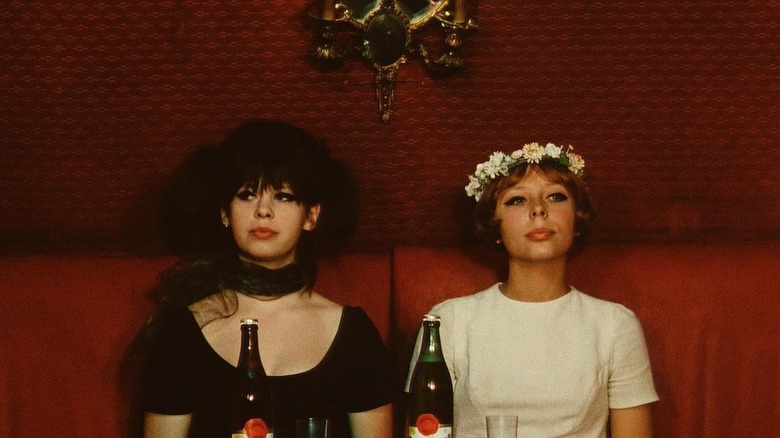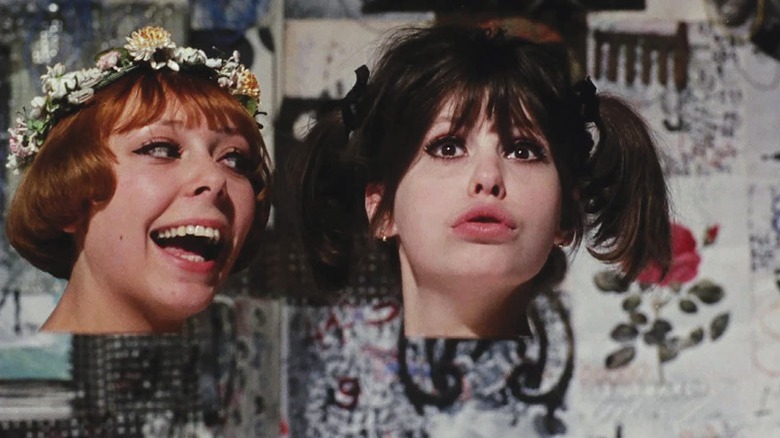The Daily Stream: Daisies Is A Subversive Classic That Still Feels Modern
(Welcome to The Daily Stream, an ongoing series in which the /Film team shares what they've been watching, why it's worth checking out, and where you can stream it.)
The Movie: "Daisies"
Where You Can Stream It: HBO Max, The Criterion Channel
The Pitch: After an introduction that focuses on images of gears turning and bombs dropping, Věra Chytilová's Czech New Wave classic opens with two young women (Ivana Karbanová and Jitka Cerhová), both named Marie, slouching against a wooden fence in their bathing suits. One picks her nose while the other plays a single note on a trumpet before boredly announcing, "I can't even do that." When they move, creaking sound effects accompany their every gesture, as if they're stiff marionettes on some unseen string. Thus begins one of cinema's most joyfully anarchic, free-association explorations of youth and womanhood — all shown through a lens of era-specific satire.
On the page, with its avant-garde subversions and coded commentary on patriarchal authoritarianism, "Daisies" might sound more like film history homework than anything else. But rest assured, it's one of the most enjoyable classics out there. The film's vibrancy and strangeness and loud, wanting women seem more at home in 2022 than in 1966. The movie, which is composed of a string of experimental, mostly playful vignettes rather than a traditional plot, was at one point banned in its home country, in part for a scene that delights in wasting food. Chytilová knew exactly what she was doing: She dedicated the movie to "those who get upset only over a stomped-upon bed of lettuce."
Why it's essential viewing
"Daisies" is often cited in film history not in reference to what's actually on screen, but in relation to its filmmaker's stated message. That's fair enough. With the status quo-flaunting Maries steering the show, the project is no doubt a pointedly political piece of art. The movie was released just a year before the Prague Spring, a period of liberalization and activism that ended by summer 1968 with the Soviet invasion of then-Czechoslovakia. "Daisies," then, exists first and foremost as a complex monument to a specific, fraught time in the nation's history.
Yet to look at the importance of "Daisies" only from the perspective of 1960s Europe dismisses how alive and ever-relevant it feels to audiences half a century later. Its leads are sloppy, greedy, and prone to massive appetites. They hunger not only for food, but for beauty, sex, adventure, and big emotions. Any seriousness is frequently undercut by their laughter, or their penchant for doll-like poses and kiddish outbursts. The young women of "Daisies" are designed to tear the pristine wallpaper off of public ideas of femininity, and to reveal all the interesting bumps and cracks beneath the surface. They feel in kinship not with any other women of their time, but with deeply modern characters like Abbi and Ilana from "Broad City."
Chytilová could've just rocked the socks off the public with her pointed social commentary, created a pair of enduring feminist figures, and called it a day. But she also made "Daisies" impressively beautiful, a surreal standout in experimental cinema. It's a work of tremendous artistry, overflowing with sequences that alternately delight and destabilize. Every new scene feels creative and spontaneous, whether the Maries are getting existential in a milk bath or blowing bubbles in a Prague nightclub. The film plays with colors, costuming, editing, sound, and narrative at every possible turn, treating formalism as a coloring page that looks better with some scribbles outside the lines. The result of Chytilová's efforts is a powerful and lively piece of art that more than stands the test of time.

